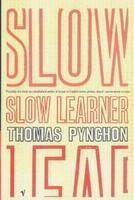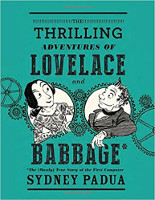 Here are my thoughts on Shikasta, the first book in Doris Lessing’s “Canopus in Argos” sequence, a very ambitious work taking in pre- and world history, origins and future of humanity; but also covering origin and failing of all major religions, human sociology and its failings, politics, ecology; and builds it all into a cosmological framework to make sense of who we are, and what we do. Sprawling, impressive, but not always easy to read.
Here are my thoughts on Shikasta, the first book in Doris Lessing’s “Canopus in Argos” sequence, a very ambitious work taking in pre- and world history, origins and future of humanity; but also covering origin and failing of all major religions, human sociology and its failings, politics, ecology; and builds it all into a cosmological framework to make sense of who we are, and what we do. Sprawling, impressive, but not always easy to read.
The rather large cover image is here to covey the full title of the book, which (with the styling of the cover) conveys some of the content and styling of the story:
Doris Lessing
Canopus in Argos: Archives
Re: Colonised Planet 5
Shikasta
Personal Psychological Historical Documents
Relating to Visit by Johor (George Sherban)
Emissary (Grade 9)
87th of the Last Period of the Last Days
Earth is a very promising planet, full of potential for development. So Canopus in Argos decides to start a colony on it, to breed the local wildlife up to the level where they can join in the Galaxy-wide exchange of good vibrations/energy (known as SOFW, Substance-Of-We-Feeling on Earth), which binds all the planets and livings things in Canopus together, and allows the exchange of information, too. The Sirian empire does the same, but on the southern land masses. Genetics are modified, new races (‘Giants’) introduced to look after the natives, and in due course, when humanity has evolved far enough, the ‘link’ with the rest of Canopus is established.
But, as the link is severely diminished due to a cosmological event, another group, Shammat, takes over. They are at odds with Canopus and Sirius, and thrive on negative emotions/energy/vibrations. They change humanity’s genetics so these principles are in our nature, thus effectively thwarting Canopus, who can only maintain the link with Earth with great effort, and using regular, numerous interventions through the use Emissionaries like Johor of the book’s title.
Earth is know as ‘Rohanda’(fruitful, living, bountiful) to Canopus, but as the link changes, so does the name: “But it was Shikasta now. Shikaste the hurt, the damaged, the wounded one”.
There follows an ice age, ‘civilization’ as we know it, with WW 1, 2, and 3 (‘the final days’).
Against this background runs the book’s main story arc: Johor, a Canopean Emissionary, has to intervene in the life of Taufiq, one of his friends, who was born into human form to affect projected history, but has gone astray under humanity’s influence. Then, later, he takes human form himself as ‘George Sherban’ (see title), to guide the chosen few through the ‘final days’ (ie WW3), and the eradication of 99+% of humanity.
If this sounds like a massive spoiler don’t worry – this is all in the first 100 pages of the book.
Lessing uses a number of concepts in the book, some more and some less familiar to the ‘average’ SF reader (as if there’s such a thing). We have:
- Seeding of planets, transportation of entire species to environments where they can evolve etc, including ‘forced development are, obviously, not exactly a new ideas.
- Re-incarnation, people having to go back to lives on Earth again and again until they’ve completed all their aspects and can let go. She doesn’t go into this aspect (and the other 6 ‘zones’ of the spiritual which surround Earth) all that deeply in this book – I would expect more of this in the other 4 volumes playing in the same universe.
- There is plenty of mythology in there, from the ancient giants, to the ‘little people’, through to alien visitor of all kind of creeds, hidden spaceships taking humans away, interbreeding with local etc. There is Atlantis. There are stone cities and monuments, laid out in geometric forms and aligned along special meridians (can you spell Ley Lines?)
- Most major religions get mentioned, there a lots of scenes I recalled from my Christian upbringing (Great Flood, Babel, Sodom & Gomorrah); but there is also a lot of Sufism, one of her great interests, which reflects in a lot of ideas and names (‘Taufiq’ is a classic)as far as I can recognize it (my research on the topic was limited to Wikipedia… I know, sophisticated…)
This is a very ambitious book. It takes pre-history, world history, mythology, evolution, politology, psychology, spirituality, sociology, religion (or, rather, theological history); all in one go, and ties them up in a cosmological framework (of which she reveals only a limited amount in this book!) to explain how they all make sense and are interlinked. I think she could start a new religion on this basis (Ron L Hubbard did it with less material).
The book itself is not really plot driven, but looks at history, at cause and effect, and ponders. Action isn’t really there, at least not of a Neal Asher kind.
Do I need to introduce Doris Lessing, one of the most important post-war writers in England? Ok, here we go… Born in Persia, grown up in Rhodesia, living in England, 88 years of age (and still going strong) as this is written. Winner of 3 Booker prices, the WH Smith Award, the Australian State Price for Literature, the Shakespeare Price, the Somerset Maughan Award, the Prix Medici,… and of course winner of the Nobel Price for Literature, despite long-standing rumours that she had been short-listed repeatedly, but got thrown off the list when it was noticed that she writes ‘Science Fiction’ (Gasp. The Horror). Which is rather ironic, given that she now regards the ‘Canopus in Argos’ series as her best work, out of the 35 Novels, 16 story collection, and 9 non-fiction books (my count)available under her name.
This is a sprawling, multi-faceted book, thought provoking and complex, which makes you look at the world around you with different eyes. So, very applicable to real life, and to quite a degree an eye-opener, and quite scare in its predictions.
Do you really need a recommendation? Get reading, if you dare!
More Doris Lessing
Title: Shikasta
Subtitle: Re. Colonised Planet 5
Series: Canopus in Argos: Archives
Series Number: 1
Author: Doris Lessing
Reviewer: Markus
Reviewer URL: http://skating.thierstein.net
Publisher: Grafton Books
Publication Date: 1981
Review Date: 10 June 2007
ISBN: 0586053107
Price: PRRP UKP3.5
Pages: 448
Format: Paperback
Topic: SF
Topic: Sociology













